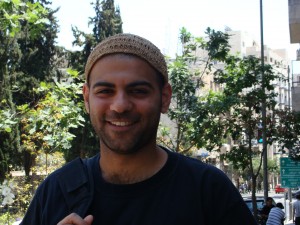
Mondoweiss, January 2, 2010
This is the fifth installation in a seven-part series. See Mondoweiss for details.
Judith, a character in Dvir Tzur’s novel Inverted Letters, lives alone on a cliff high above the sea. Judith was a settler, but her children live in the Diaspora. Gazing towards unseen lands beyond the water, Judith is no longer sure why she’s here.
Tzur, 31, whose work echoes Yosef Haim Brenner’s, explains that Judith is similar to many Israelis. She has stopped believing in her country. And she fails to see the big picture.
“Zionism has two layers. There’s the geographical layer,” he says, “and there’s the cultural layer. People are stuck in the geographical layer and don’t see the other layer. But both are equally important.”
And both are plagued by the same problem, “We [Israelis] don’t know who we are. We want to be European, but we’re not. We’re Asian,” Tzur, whose family roots lay in Kurdistan and Iraq, says.
Though Israel’s identity crisis seems to be a social issue, Tzur explains that it affects the nation’s security, as well. “If you know it’s wrong for Palestinians to shoot rockets at Sderot then you don’t wait eight years to retaliate.” The subtext to Israel’s inaction, he says, is similar to Judith’s, “We don’t know what we want, we’re not sure we’re going to be here in a generation, we’re not sure we have a right to be here.”
That is why the United States, which Tzur refers to as “the second center of the Jewish nation,” is crucial.
Tzur isn’t talking about American money or political support. He’s talking discourse, “It’s important to hear the voices coming from the States, even if we don’t agree with them. America offers alternative ways of thinking about Judaism and that can help Israelis see, personally and collectively, who we are.”
Turning back to our traditions is another step towards resolving our identity crisis, says Tzur, who dons a kippah. “I’m not religious,” he emphasizes. “I’m a traditionalist. If there’s one thing that has kept Jews a people, it’s the traditions.”
But Tzur’s call for Israel to find itself doesn’t translate to a call for an exclusively Jewish state. Tzur, once a supporter of Hadash, a political party popular with left-wing Israelis and Arab-Israelis, hopes to see a confident and open Israel. “I don’t want to live in a ghetto,” he remarks. “And I don’t want to be like Judith. I want to know my kids will be here.”
This series was printed in its entirety in the Fall 2009 print edition of Zeek, Israelology, which was distributed to J-Street conference attendees.